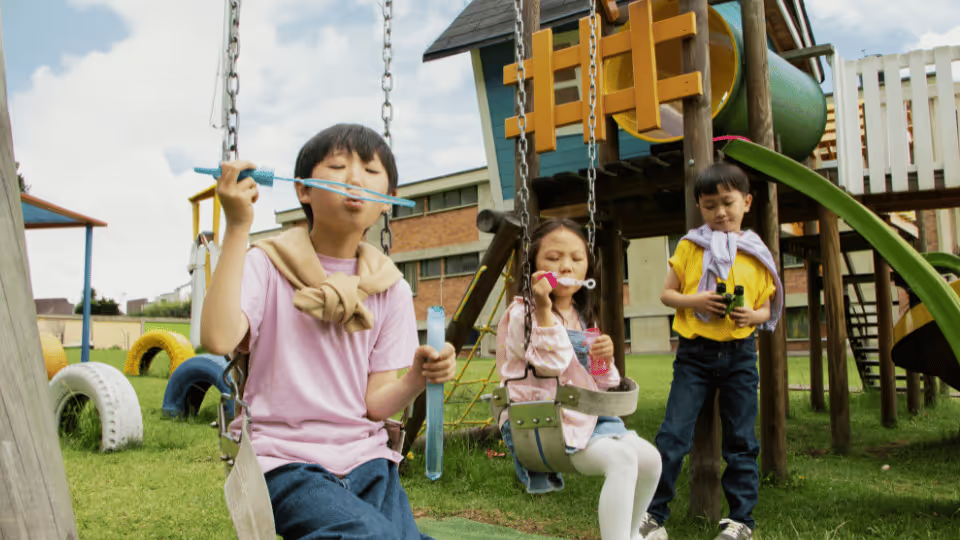
Coral Care content is reviewed and approved by our clinical professionals so you you know you're getting verified advice.
Find effective support for developmental delays, quickly.



Concerned about your child's development?
Our free screener offers guidance and connects you with the right providers to support your child's journey.
Summer is the perfect time to take speech therapy outside and turn everyday play into powerful learning moments. With just a few common garden or backyard items, you can create fun and engaging language games that boost your child’s speech and communication skills—without feeling like work. These outdoor activities offer fresh air, fun movement, and meaningful practice all rolled into one. Let’s explore how your own backyard can aid your kid’s language skills!
Key Takeaways
- Outdoor play can enhance speech development: Your garden or backyard offers a natural, low-pressure environment for youngsters practicing language skills.
- Everyday items become powerful tools: Common outdoor objects can be used creatively to support a wide range of speech and communication goals.
- Speech practice can be fun and engaging: With the right games, children can build speech skills while staying active and enjoying summer activities outdoors!
- Coral Care supports pediatric speech and language development by offering personalized therapy from a team of friendly, expert clinicians. Our compassionate approach helps children feel comfortable and confident as they build essential communication skills through engaging, evidence-based practices, all from the comfort of your own home.
Benefits of Outdoor Play in Speech Therapy

Outdoor play goes beyond fun and games; it plays a crucial role in holistic development, particularly in speech therapy. Outdoor activities boost overall health and well-being, significantly enhancing cognitive function and attention. These cognitive enhancements set a robust foundation for language development.
The sensory-rich outdoor environment provides diverse experiences that enhance sensory processing, essential for speech and language development. Children acquire new nature-related vocabulary and engage in meaningful conversations, enriching their language skills. The excitement and novelty of outdoor activities significantly boost children’s motivation and engagement during speech therapy.
Outdoor play fosters social skills through group interactions, enabling children to practice turn-taking, sharing, and collaboration. Consistent, creative, nature-based activities powerfully supplement formal therapy, ensuring children benefit from both structured and spontaneous learning. Multisensory experiences from outdoor play significantly enhance speech and language development.
Everyday Items as Therapy Tools
A major advantage of summer speech therapy is using everyday backyard items as effective therapy tools. Water balloons, for example, can be a playful method to practice speech sounds while discussing size and spatial concepts. A simple water balloon toss, where each splash provides an opportunity to articulate new words, brings laughter and learning together.
Plastic containers are versatile tools, ideal for sorting and matching tasks that help fill multi-step instructions. Using everyday items like these as therapy tools makes backyard-based speech therapy both practical and enjoyable, allowing individuals to target specific skills.
These activities transform ordinary objects into extraordinary learning opportunities, seamlessly integrating therapy into play.
Expressive and Receptive Language Games
Using garden items for expressive language games makes speech therapy sessions more engaging and effective. Movement-based games like ‘Flower Says’ effectively stimulate both language skills and physical activity. Following commands in these games enhances receptive language while kids have fun outdoors.
Descriptive clue games like ‘What Am I?’ with nature objects support inferencing and descriptive language. Naming and describing garden tools and plants effectively expand vocabulary and improve labeling skills. These interactive games naturally integrate learning new words and concepts into play.
Using elements like flowers in storytelling helps children practice descriptive language. Games like ‘Simon Says’ can be adapted to focus on gardening vocabulary, making them educational and fun. Sensory bins with garden items foster hands-on learning and language development, offering a tactile method to explore new vocabulary and concepts.
Scavenger hunts facilitate discussions and articulation practice through structured play. Asking children to find items matching specific descriptions or starting with certain sounds turns a simple backyard activity into an effective speech therapy session.
Articulation and Phonological Games in the Yard

Articulation and phonological games are crucial for practicing specific speech sounds and improving clarity. Scavenger hunts effectively combine the thrill of the hunt with articulation practice by searching for objects starting with specific phonemes. This activity transforms a regular yard into a treasure trove of learning opportunities.
Reading summer-themed books fosters articulation practice and comprehension through questions and discussions. Sound sorting with natural materials, like grouping rocks or sticks by initial, medial, or final sounds, is another engaging way to practice phonological skills.
Repetition drills combined with movement, like hopping for each sound, enhance practicing articulation by making it dynamic and fun. These activities offer ample opportunities for children to practice speech sounds in a playful and interactive environment, ensuring learning feels like summer fun.
Functional Communication Games for Social Use
Functional communication games are essential for developing social skills and using language in real-life situations. Here are some examples of imaginative play with items like laundry baskets that foster speech development through creative scenarios:
- Children can pretend the basket is a boat, creating dialogues about their journey.
- They can use the basket as a spaceship, discussing their adventures in space.
- The basket can also serve as a car, where they can talk about their road trip experiences.
These activities help expand their vocabulary words and encourage students’ creative thinking with word lists and ideas.
Including family members in speech practice makes learning more enjoyable and highlights the value of personal connections in communication. Consistent home involvement in speech therapy practice enhances a child’s progress and confidence. Using solo cups as microphones to echo animal sounds transforms a simple activity into a vocabulary-building session that can send home valuable skills.
Summer themes like Independence Day or Shark Week engage older students and broaden discussion topics in therapy. Singing during play enhances phonological awareness and sound imitation skills. These summer activities make speech practice fun and help children develop essential communication skills naturally and enjoyably.
Modifications for Different Ages and Abilities
Tailoring speech therapy activities to different ages and abilities is crucial for effective learning. Increasing complexity for older or advanced learners keeps them challenged and engaged. Visual aids support children with varying abilities during speech therapy activities, making instructions clearer and more accessible.
Games make speech therapy more engaging for children of different ages. Adjusting the pace of activities helps maintain the interest of children with varying attention spans. Safety considerations are crucial for outdoor speech therapy sessions, ensuring all activities are fun and safe.
Incorporating strategies for kids with Autism or developmental delays in speech therapy planning is essential. These modifications ensure every child can participate and benefit from the activities, regardless of their abilities.
"I Spy" Games for Language Skills
“I Spy” games are a fantastic way to enhance language skills through fun. These games support receptive language and following directions by focusing on colors, shapes, and functions. For example, playing “I Spy” with different flower colors or leaf shapes encourages children to search and describe what they find.
Using a bingo board or incorporating a scavenger hunt makes the game even more exciting. These fun activities build vocabulary and improve attention to detail and observational skills, enhancing background knowledge.
“I Spy” games are simple yet effective for making language learning a delightful part of summer play.
Story Sequencing with Nature Walk Finds
Nature walks offer a treasure trove of items for story sequencing, enhancing narrative skills. Using natural items like leaves, rocks, and sticks found outdoors promotes creativity in storytelling. Children can collect these items to create their own stories, arranging events based on their discoveries.
Gardening-related storybooks can also promote descriptive language and storytelling. Incorporating elements from nature walks into these stories enhances children’s understanding of story structure and narrative flow.
Story sequencing with nature walk finds makes storytelling interactive and hands-on. Using leaves, flowers, or bugs, children can create their favorite part of the main character and plotlines, bringing their stories to life tangibly.
Tips for Parents and Therapists
Parents and therapists play a crucial role in supporting children’s speech therapy. Incorporating speech language pathologists into daily routines, like during meals or play, creates natural learning opportunities. Allowing children choices encourages them to use language to express needs and preferences.
Visuals support children’s understanding of daily routines and vocabulary development through pictures. Short, frequent practice sessions are more effective than longer, potentially frustrating ones. Communication activities help individuals recognize different interaction styles.
Role-playing scenarios enhance vocabulary and build confidence in social settings. Specific positive reinforcement helps children recognize commendable behaviors or actions. Establishing a simple speech therapy routine at home significantly impacts a child’s progress.
Keeping Summer Speech Therapy Fun

Making summer speech therapy fun is key to maintaining children’s interest and motivation. A playful and silly environment enhances engagement and willingness to practice speech. Singing songs and nursery rhymes significantly improve language skills by reinforcing sounds and memory through repetition, ultimately benefiting their speech and language skills.
Fun and low-pressure summer speech therapy activities encourage consistent participation. Reinforcing language goals outside formal therapy sessions is crucial. Making speech therapy a fun and enjoyable part of summer break increases children’s likelihood to engage and make progress.
Summary
Summer speech therapy using garden and backyard items offers a unique and effective way to enhance language development. The benefits of outdoor play, creative use of everyday items, and engaging language games combine to create a powerful learning experience. From articulation and phonological games to functional communication and story sequencing, these activities cater to various ages and abilities, ensuring that every child can benefit.
By incorporating these fun and innovative activities into speech therapy sessions, parents and therapists can make learning enjoyable and effective. The key is to keep activities playful and low-pressure, encouraging children to participate and make consistent progress. Embrace the summer season and transform your backyard into a speech therapy haven.
Frequently Asked Questions
To effectively support children's speech therapy, try incorporating language practice into daily activities, using visuals to enhance understanding, and offering choices to keep them engaged. Consistent positive reinforcement and a simple routine at home can make a big difference in their progress.
You can enhance articulation and phonological skills in the yard by doing fun activities like scavenger hunts for specific sounds and sound sorting using natural materials. These interactive methods make learning engaging while incorporating movement!
Expressive and receptive language games like 'Flower Says', storytelling with flowers, and scavenger hunts can really boost your skills in a fun way. Give them a try!
Everyday items like water balloons and garden tools can really enhance backyard speech therapy sessions by making practice fun and interactive. Use these tools to encourage speech sound practice and following instructions!
Outdoor play is a fantastic way to boost speech therapy as it enriches vocabulary, enhances social skills, and helps with sensory processing. Plus, the fun environment keeps kids engaged and motivated!




.png)
